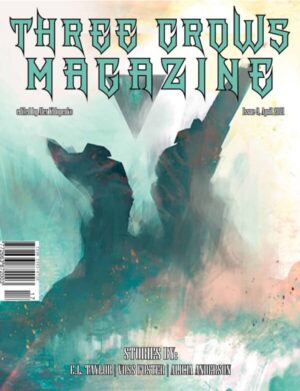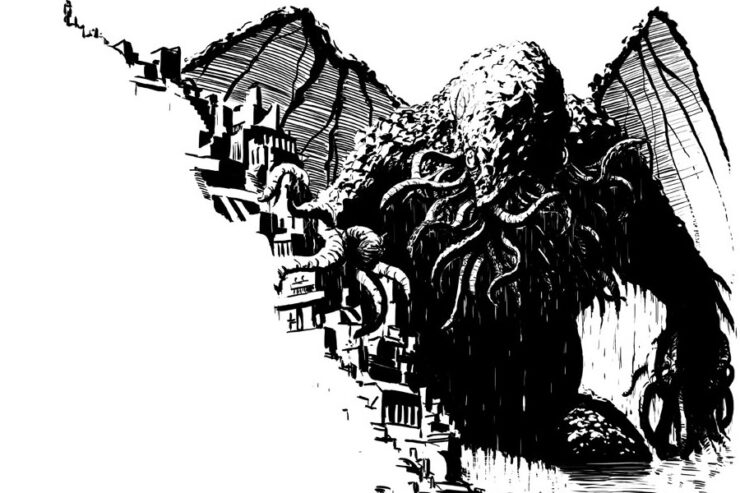Welcome back to Reading the Weird, in which we get girl cooties all over weird fiction, cosmic horror, and Lovecraftiana—from its historical roots through its most recent branches.
This week, we cover C.L. Taylor’s “The Limb Garden,” first published in the April 2021 issue of Three Crows Magazine. Spoilers ahead!
For twenty-nine days and twenty-eight nights, she tended the offering and it had grown into another limb. This time, a pale and plump leg, with a perfect set of toes.
Lilifer Greene visits Dr. Bergman, a surgeon with a “track record of producing results in the most dire of cases.” Evidently her case is beyond dire, because his prognosis offers no hope. She’s not surprised—her mother’s journal warned of the symptoms: dull hair, rough skin, loose teeth. She’s tried to ignore the signs, cupping the belly she prayed might still “swell with life.” No. The millennia-old knowledge she’s guarded will be lost; the fertile land she’s protected will “lie fallow and be, eventually, forgotten.” She’ll be the last Greene unless, like her mother and grandmother, she takes matters into her own hands. Gesturing to her womb, she tells Bergman she wants it out, “all of it, as soon as possible.”
Look at two months of recovery as a “vacation,” Bergman advises, but Lilifer’s never had a vacation. The Greene estate and flower shop have always needed looking after, and now she must plan the garden she’ll plant in March, at the vernal equinox. She’s acquired the pieces of her body that the doctor wrenched out. She’s saved her “monthly blood,” though she fears not enough of it; by the time she absorbed her prognosis, “the calendar was against her.” From the Greene family gardening manual, she recites the Botanist’s Prayer: “In all things, the Earth is Mother. She is eternal. To care for the earth is to provide for mankind.” Only she says “humankind” instead, hoping the substitution won’t ruin the spell. “To respect Her is to respect thyself. To give unto Her is to receive.”
She divides her salvaged womb into three equal pieces, for three tries.
Buy the Book


Spring’s Arcana
The first piece she plants by moonlight; from a Mason jar, she sprinkles it with her saved blood. The Sowing Prayer is short: “Mother Earth, accept my humble offering and hear my plea. Give unto me, in one month’s time, a garden of limbs that I might call mine.” She should “water” the planting nightly, but given the shortage of blood she tries every third night. The crop grows nevertheless, poking pink fingers from the soil, increasing by the eighth watering to a miniature arm. Lilifer holds its hand and coos. It won’t be much longer now.
The radio warns of flooding. Lilifer goes out to protect her crop. A man drives up to the Greene Thumb Floral Shop. He refuses to accept that it’s closed: It’s his wife’s birthday, she’s not happy with him, and she loves Lilifer’s shop. He barges into the yard, snatches at tulips, then bumbles into her mother’s garden. What he sees there makes him shriek. Later Lilith will tell herself that the shovel blow to his head killed him instantly, but he twitched for fifteen minutes afterwards.
She hides his car in the carriage house, strings the man up behind the cottage, and drains his blood. Heavy rain follows as promised, and the arm thrashes. Lilifer rushes to save her crop, but it’s too soon—she yanks forth nothing but the arm and a “tangle of veins”.
Her second try, she waters every night with a mix of her own blood and the intruder’s. A perfect little leg grows, and on the 29th night, under the next full moon, she harvests a perfect little leg—but only a leg.
For her third and last try, she spares no expense or effort. When a blue-eyed head sprouts, she tends the “firstling” day and night, sleeping beside it, reading aloud from fairy tales and encyclopedias. A button nose emerges. Full red lips whose first word is “Hungry.” She spares a few drops from her dwindling blood reserves, but the firstling keeps howling for more. The vigor of its demands is a good sign, but to ensure a successful harvest she must keep it well-fed. And so Lilifer cuts her palm and pours the flow into the firstling’s giggling mouth.
Indulged daily, it grows fast. Lilifer dwindles. “Mother,” the firstling calls her. It wheedles to come into the house, to become a family, and, fingers sprouted, it runs them through her dull brown hair. But they must wait until the end of the month, and Lilifer must prepare the house and finish writing her journal. On the evening of the full moon, she seals a note in an envelope addressed to “Asher” and goes to the garden with a knife.
She reads the firstling its favorite story, “The Juniper Tree.” It giggles when the tale’s mother dies of happiness cradling her longed-for child. “That will be you, Mother,” it says. It’s so impatient—was Lilifer this impatient for her harvesting? She kisses its forehead; it bites her jaw, drawing blood—it’s so hungry!
When it’s unearthed, Lilifer says, it mustn’t drink blood again, for it will walk as a human. “But, I am not human,” it protests. “Aren’t you?” Lilifer asks. She may well wonder, because the firstling’s now six feet tall, growing hair all over its body. “Cut me free,” it demands.
Does it know what will happen when she does? Was her own mother this scared? Nevertheless, Lilifer steps into the firstling’s embrace. “I will lay you in the ground next to grandmother,” it whispers, squeezing her until her vertebrae crack. “And we will be a family.”
“Always,” Lilifer gasps.
Asher wonders for years if Mother knew how much it needed and loved her. Eventually it reads her journal and note and understands its place in the world. Like the earlier Greenes, Asher takes on the duties of the florist. In time, it plants a garden of its own.
This week’s metrics:
What’s Cyclopean: The growing limbs tread a line between adorable and disturbing. In the ground they are “tiny pink nubs” or ticklish feet with “dainty toenails, so soft and pink.” Picked, they’re horror for both would-be mother and reader: “a nub of bone and a tangle of veins that dripped thick black blood onto the soil.”
The Degenerate Dutch: Lilifer’s unwelcome customer goes quickly from offers of payment to complaints about his “missus” to gendered insults and demands to pick her flowers. Why should it matter, she has so many of them?
Libronomicon: The Greene family gardening manual is not exactly The Farmer’s Almanac. Also on Lilifer’s bookshelf are encyclopedias and fairy tale collections to read to budding offspring.
Anne’s Commentary
As a gardener myself, I have instant sympathy for characters with dirt under their fingernails and radios attuned to the NOAA weather forecasts. Given the success of the Greene Thumb Floral Shop (we’ll forgive that pun of a name), the Greenes have for generations been master horticulturists. Merriam-Webster defines “horticulture” as the science and art of growing fruit, vegetables, flowers and other ornamentals, but the Latin root of the word is “hortus” or garden. And must the produce of gardens be limited to plants? Hieronymus Bosch’s Garden of Earthly Delights has sprouted fleshy limbs—and other body parts—enough. Then there are the old myths about babies coming from gardens, cabbage patches in particular: For some very convincing views of how cabbagogenesis works, see these Edwardian era postcards. [RE: When they tell you everything’s a brassica, they mean it!]
Off the bat, I recall two disturbing (fictional?) instances of babies raised from the soil. In T. E. D. Klein’s Petey, two women at a party look over a book of folk tales from Provence. One tale, “Le Petit Diable,” is about a farmer who plants a bean seed and waters it every day; eventually he harvests a boy who is supposed to help around the house and garden, but who instead gets into all sorts of mischief like eating the neighbors. I’ve been looking for an actual folk tale, French or otherwise, about a bean-inspired little devil, but nothing quite matches.
The other instance comes from the 1951 movie The Thing from Another World. Obligatory Overzealous Scientist, Dr. Carrington, plants seeds from an alien humanoid’s severed arm, feeds them on human blood, and soon has a fine crop of pulsating podlets crying for more of that good red stuff.
Whether or not the Greenes have been an unbroken line for all the millennia their occult secrets have existed, they might be those secret’s last guardians, or so Lilifer fears. She’s hoped to escape her foremothers’ fates, but the story opens with the shattering of that hope. Her womb is too diseased to bear fruit in the normal way, according to the most astute medical specialist the Greene fortune can buy. Or is her womb diseased, I wonder. Maybe it’s a fruit that has simply reached the point of messy ripeness when it must fall to earth and pass its seeds into the care of the Eternal Mother—and one of Her faithful gardeners.
I’m thinking that neither Lilifer nor any of her predecessors ever had a shot at reproducing as human women do. Simple reason why: They weren’t human, even though they pass as Lilifer tells Asher he must do. Asher’s counterargument is irrefutable: He’s not human. “Aren’t you?” Lilifer asks. She apparently has walked so long as a human that she’s forgotten her true nature. For was she not born as Asher is being born, as her own mother was born? And so it must go, further and further back along the Greene line until one reaches the original human mother who wanted a child so much she’d willingly die in its first embrace.
An alternate reading would be that the Greene line had no human progenitor; instead they’ve always been an other-than-human species that mimics humans. An extraterrestrial species, to lean science fiction; a fairy race, to lean fantasy? The gardening method of the Greenes reads more magical than natural to me, not to dismiss the precept that science sufficiently advanced from one’s own would seem like magic. Or if not science per se, some (to us) weird-natural process that provides an example of Dr. Malcolm’s “Life finds a way.”
For me, Taylor’s story has the savor of fantasy. Either way, I’m curious why Lilifer’s firstling turns out to be male. I shouldn’t have been surprised—she mourns that her initial attempt has neither penis nor vagina, so obviously either sex is a possibility. Could be I started out envisioning an endless matriarchal line, Mother Earth producing more mothers from mothers, but if mere lower-case life can find a way, surely Mother Earth can. Eventually Asher starts his own garden. Have his reproductive organs also failed to function in the human manner? Does he have to salvage and subdivide his “diseased” testicles and feed them with hoarded semen? Or maybe it’s got to be blood, or some of each, in which case he could also make use of the occasional disgruntled customer locked out of Greene Thumb Floral Shop.
I smile, but it does sadden me to think that the Greenes are solitary creatures most of their lives, longing for family when producing that family will demand the elder’s death.
Gardening’s no occupation for those without the “courage of will and strength of character” to see the sowing through to harvest, especially when the harvest eats the gardener and not vice versa.
Ruthanna’s Commentary
My opening question, reading “The Limb Garden,” was why Dr. Bergman so passionately combines patronizing doubts about Lilifer’s comprehension with desire for her to understand her diagnosis—usually the sort of doctor who taps your knee for attention doesn’t put much effort into successful patient communication. By story’s end, I suspected more going on than an urgent need for truly informed consent to surgery. I would guess there’s something about her diagnosis that he doesn’t understand, and that his bedside manner (such as it is) is cover for his own confusion. After all, it isn’t every day that you encounter plant diseases in apparently human women.
I’m gonna go out on a limb (sorry not sorry) and recommend that the Greenes incorporate fungicide, maybe some companion planting for pest control, into their traditional rituals.
Asher’s giggly bloodthirst put me in mind of Audrey II (“More, more!”), but also of the nursery-full of disturbing children previously encountered in our column. In that context, Asher ripening into a mostly non-anthropophagous member of the community is a pleasant surprise. Not much consolation for Lilifer, though.
Here’s where I trip around the actual point of the story and into questions like: It’s great to have a child of your flesh and all, but have you considered adoption? It’s a pet peeve: I’m not genetically-related to any of my kids, and it turns out that after a few sleepless nights with an infant, genes don’t make a hell of a lot of difference. My spawn manage to take after me anyway. Then again, 1) we are the same species, and 2) I have actual childhood experience to draw on in figuring out how to parent. If your family has for generations fruited into full motile adulthood at the moment of their precursor’s death, you probably don’t have much clue about diapers.
Humans, too, risk everything—and sometimes sacrifice everything—to produce children. We go through complicated rituals (tracking ovulation, anyone?), use up limited resources (expensive deliveries from the sperm bank, rounds of IVF), and mourn lost chances and miscarriages. Lilifer, at least, has relatively straightforward options for dealing with men who ignore her stated boundaries and try to interfere with her reproductive choices. Those choices are very different from mine, but I respect them.
More questions: What “warnings” did Lilifer’s mother leave behind, that she doesn’t heed? At this point she’s following the rituals to the letter, which her mother seems to have also done. Her mother seems to have made the same “Ritual Offering” at Lilifer’s birth—so what’s to warn about? Is there some greater risk in what Asher will become? The Greenes have quietly run the floral shop for generations without an obvious trail of bodies, so either the risk is low or the town happily overlooks a few mysterious disappearances for the sake of high-quality bouquets.
Maybe the warnings have to do with the family’s non-human nature. They may walk the earth as humans, but they’re something other. Not precisely animal, and not precisely plant—and despite the pressures of genre, there’s no indication that they’re especially fungal (though I’m still wondering about the nature of that “infection”). There’s a hint, perhaps, in their names. “Lilifer” seems like a cross between Lilith and Lucifer. “Asher” is a perfectly nice biblical name meaning “happiness,” but also resonates with “Asherah,” a Canaanite fertility/earth mother goddess that the Torah specifically warns against worshipping. (I learned this from someone who worshipped her anyway.) Taken together, they imply something primordial, perhaps predating our modern kingdoms and categories. Lilim or nephilim, something that lives alongside humanity without ever being quite of us. And without ever being quite safe to live alongside.
Next week, join us for Chapter 10 of Hilary Mantel’s Beyond Black.
Ruthanna Emrys is the author of A Half-Built Garden and the Innsmouth Legacy series, including Winter Tide and Deep Roots. You can find some of her fiction, weird and otherwise, on Tor.com, most recently “The Word of Flesh and Soul.” Ruthanna is online on Twitter and Patreon and on Mastodon as [email protected], and offline in a mysterious manor house with her large, chaotic household—mostly mammalian—outside Washington DC.
Anne M. Pillsworth’s short story “The Madonna of the Abattoir” appears on Tor.com. Her young adult Mythos novel, Summoned, is available from Tor Teen along with sequel Fathomless. She lives in Edgewood, a Victorian trolley car suburb of Providence, Rhode Island, uncomfortably near Joseph Curwen’s underground laboratory.














